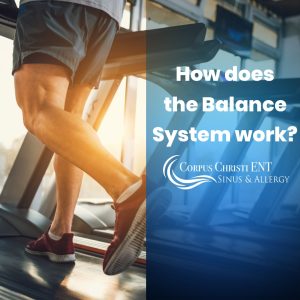
We have all probably felt a little off balance or dizzy when we spin around for a period of time, or get off a boat, or sometimes even step off of a treadmill. This feeling usually lasts for a short period of time and then we go back to normal. How or why does this happen? There are three different systems in the human body that help us with balance. These are the Proprioceptive system, our Vision, and the Vestibular system located in the ear. As long as two of the three are functioning correctly, we have no problem. When two or more systems become compromised, then we have problems.
The Proprioceptive system is a series of sensors in our muscles that tell us where and how are body is oriented.
For example, we don’t have to look at our hand to know we are holding it out. The sensors in the muscles tell our brain how far, in what direction, and what force we are using. When we lose sensation from our muscles, then we don’t know how our muscles are moving. If our feet our numb, we might trip or miss a step because we don’t have that sensory information going up the brain to tell us that we have lifted our foot high enough.
Vision assists in balance. We can look around us and see what is around us and orient ourselves to it. Optical illusions can really give us a hard time with balance. Bent poles that hold signs along with creative painting on a floor or wall can make you feel like you are not standing upright, even when you are. Individuals with vision problems may often find themselves bumping into furniture or walls when they walk. The same thing happens when we try to walk in the dark.
The Vestibular system is located in the inner ear, and is actually connected to the cochlea, the sense organ for hearing. Inside the Vestibular system we have three fluid-filled semicircular canals on each side of the head. Each of these canals is oriented so it is perpendicular to the other two. They are filled with fluid and contain sensors at the base. As we move our head, information about the direction and speed of movement is sent to the brain. When the vestibular system becomes compromised, such as when we get an inner ear infection, or the fluid levels in the semicircular canals is off, then we feel dizzy.
As mentioned previously, as long as two of the three systems is functioning, we are usually fine. Information about our motion, along with visual input, as well as input from our muscles, can help us from feeling dizzy. This is one reason why people who get car sick need to sit near the front of the vehicle, so they can see in front of them and get the visual input and proprioceptive information together to overcome the information coming from the vestibular system about movement. It’s also why it is easy to become disoriented when knocked down by a wave or in an avalanche of snow. Our visual system is no good, because we no longer can see the horizon, so we have no reference for direction and then our vestibular system goes crazy when it receives so much input at once. And we may have all heard stories of someone who has had too much alcohol to drink, and they can’t go to sleep because the bed is spinning. Alcohol effects the Vestibular system in a couple of ways. It causes a fluctuation in the weight of the fluid in the inner ear, causing it to send conflicting messages to the brain. It causes the spinning sensation, so the Vestibular system is out of order. Then you turn off the lights and close your eyes, so the visual system has nothing to contribute. Now all you have is your proprioceptive system telling you that you are laying down. The results is the sensation of spinning.